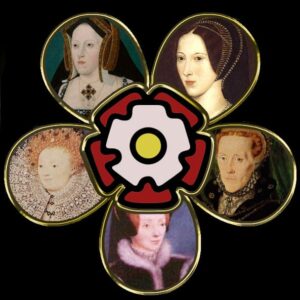
Today is International Women’s Day, a day to “Celebrate the social, economic, cultural and political achievement of women”. This year’s theme is gender parity and you can find out more about the campaign at International Women’s Day.
While this day should make us think about issues facing women around the world today, it always makes me think of the women from history who fascinate me, women who made an impact on the time in which they lived. Here are just a few of the women of the Tudor period who fascinate me:
- Catherine of Aragon – Her strength in standing up to Henry VIII and fighting for her marriage is something that I admire. It may well have been easier for all concerned, particularly for her daughter, had she submitted to the king, but she stuck to her beliefs whatever the king threw at her.
- Anne Boleyn – There is so much that draws me into Anne’s story, and which still draws me after seven years of researching her. While she was a tragic victim, she never acted like one. She had so much strength and faith in her last days and I can’t imagine what it must have been like waiting for death like that and knowing that you’re not going to see your daughter and family again. I also admire her religious faith, her intelligence and wit, and her patronage of art and religious reform.
- Catherine Parr – A published author, a passionate reformer and someone who knew how to get out of a tight spot – what’s not to like about this queen?
- Anne Askew – Could I stick to my beliefs and refuse to betray others while being racked until my joints all dislocate? Right up until death by being burned alive? Well, I’d like to think so but I’m not so sure. That’s what Anne Askew did, though. What faith and courage!
- Mildred Cecil (née Cooke) – The Cooke family fascinates me anyway, with Sir Anthony Cooke being a man who believed that daughter should receive an education equal to sons, but Mildred is a fascinating lady in her own right. She was fluent in French, Greek and Latin, and built up a huge library of Greek and Latin texts, which included works on medicine, religion, literature and history, as well as literature. She was married to William Cecil, Lord Burghley, Elizabeth I’s right-hand man, and I can imagine that the marriage was a real meeting of minds.
- Catherine Brandon, Duchess of Suffolk (née Willoughby) – Catherine was known for her firm faith and her outspoken defence of reform. She was part of the circle of reformist women who were friends with Queen Catherine Parr, and had many humanist and reformist books dedicated to her. She was a known Protestant patron, helping clergyman of a reformist persuasion. One story about her always makes me chuckle: apparently, she had a dog that she named “Gardiner” after Stephen Gardiner, Bishop of Winchester and a staunch Catholic, and she enjoyed being at court with the dog and calling it “to heel” by name! I bet that went down well with the bishop!
- Elizabeth I – She rose from being the daughter of an alleged traitor to being queen, from being an ignored “bastard” to the famous Gloriana, and she ruled England for over forty-four years with a reign known as the Golden Age. The idea that her reign was a golden age is being challenged by some, but there’s no denying the strength and conviction of this lady who was imprisoned in the Tower of London and must have feared execution in her half-sister’s reign.
- Mary Tudor, Queen of France – This lady has just recently piqued my interest. I was reading the letters she wrote after the death of her first husband King Louis XII for a talk I was doing and I was just amazed by them. Here was an eighteen year-old Tudor woman attempting to twist her older brother, King Henry VIII, around her little finger. Mary politely reminded Henry of the promise he’d made to her when she left for France to marry the ageing Louis XII, i.e. that she could marry whoever she wanted next time round, and reminded him that she’d stuck to her end of the bargain by marrying the king, then she went on to state that she now wanted to marry someone of her choosing (Charles Brandon), finishing with a bit of blackmail: to paraphrase, “stick to your promise or I’ll enter a convent and then you won’t be able to get at my dowry”. Brilliant! She knew just how to handle her brother and the letters made me chuckle and be in awe of this intelligent woman and her rhetoric.
I could go on and on, as there are so many 16th century women who fascinate me, but, instead, I’d like you to comment below with the names of 16th century women you find fascinating and your reasons for choosing them. Thank you!